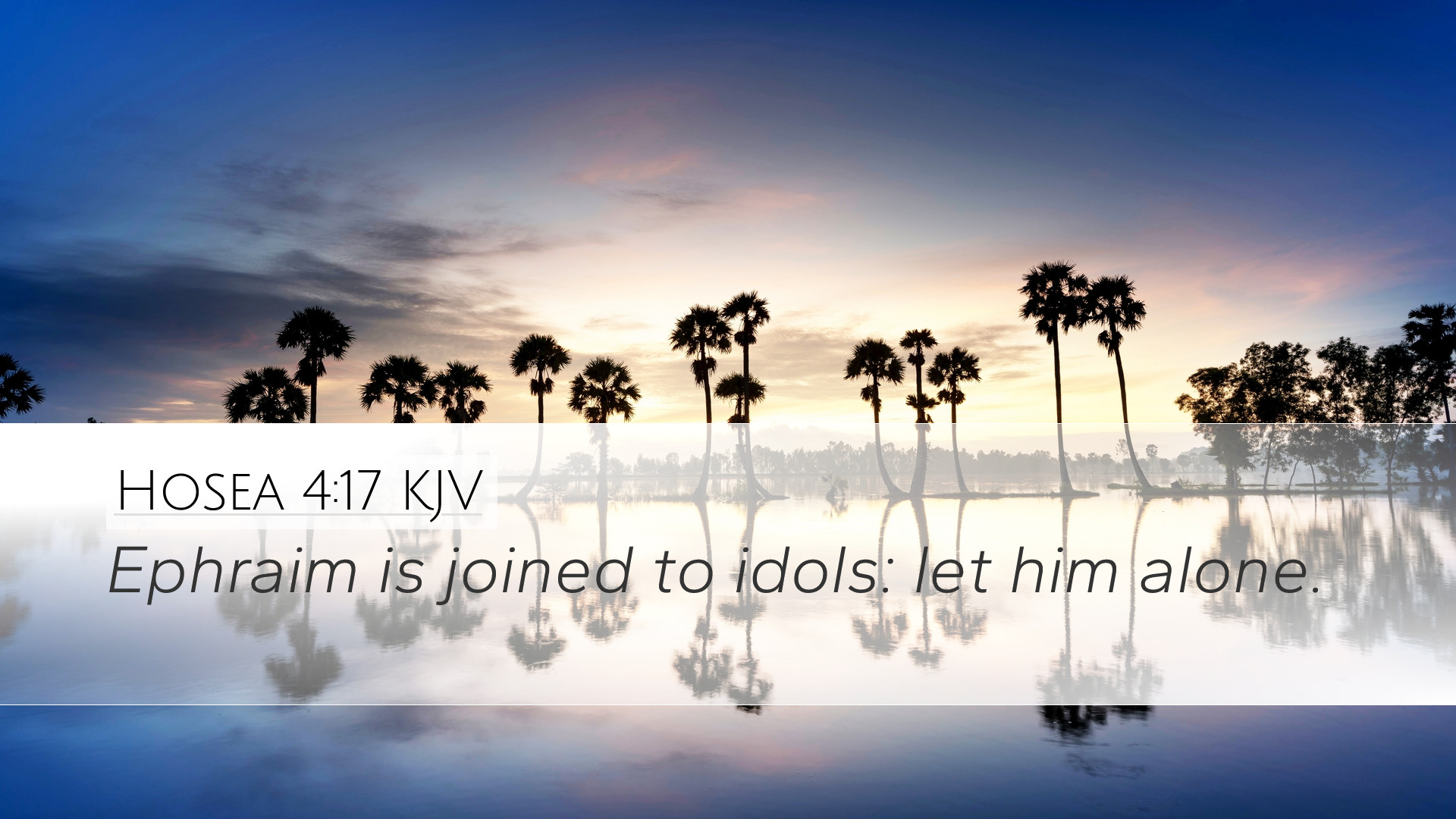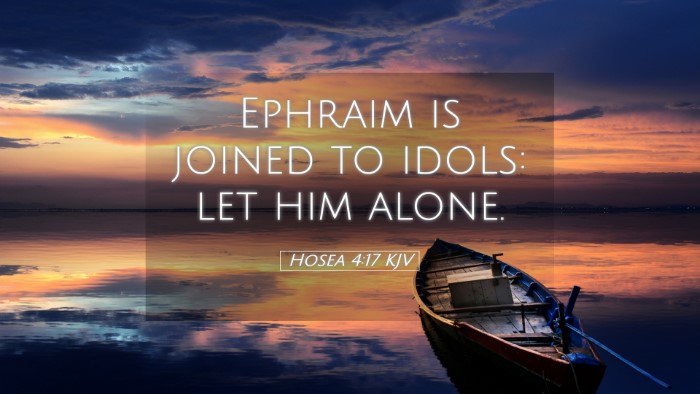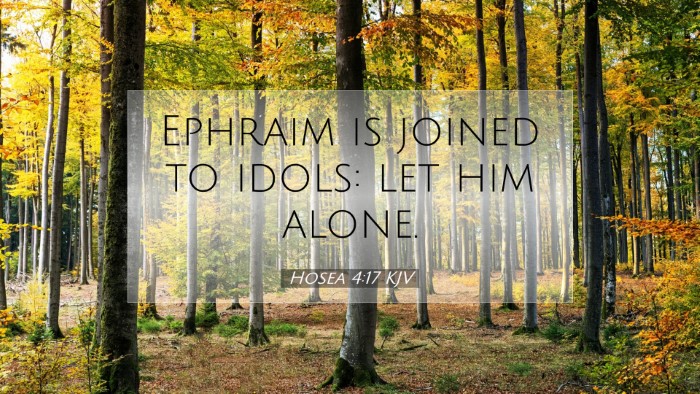Old Testament
Genesis Exodus Leviticus Numbers Deuteronomy Joshua Judges Ruth 1 Samuel 2 Samuel 1 Kings 2 Kings 1 Chronicles 2 Chronicles Ezra Nehemiah Esther Job Psalms Proverbs Ecclesiastes Song of Solomon Isaiah Jeremiah Lamentations Ezekiel Daniel Hosea Joel Amos Obadiah Jonah Micah Nahum Habakkuk Zephaniah Haggai Zechariah MalachiHosea 4:17
Hosea 4:17 KJV
Ephraim is joined to idols: let him alone.
Hosea 4:17 Bible Commentary
Commentary on Hosea 4:17
Verse Context: Hosea 4:17 states, "Ephraim is joined to idols: let him alone." This verse reflects a significant turning point in the prophetic work of Hosea, addressing the larger context of Ephraim—often representative of the northern kingdom of Israel—and its idolatries.
General Insights
This passage serves as a poignant admonition regarding the consequences of idolatry. The prophet Hosea conveys God's message of mourning over Israel's spiritual infidelity. The overarching theme reveals a contrast between divine fidelity and human unfaithfulness.
Matthew Henry's Commentary
Matthew Henry elucidates the profound irony within this declaration. He notes that Ephraim, a symbol of strength and abundance, has now become synonymous with idolatry. The phrase "let him alone" is particularly striking, suggesting a state of divine abandonment. Henry observes that when individuals or nations choose to pursue sin relentlessly, they may reach a point where God withdraws His protective grace. This is not a license to sin but a lamentation over a heart hardened against divine instruction.
Albert Barnes' Commentary
Albert Barnes provides further depth by explicating the spiritual ramifications of Ephraim's attachment to idols. He emphasizes that the phrase indicates a divine decision to permit Ephraim to follow its chosen path—a path leading away from truth and righteousness. Barnes points out that this divine withdrawal serves as a warning to others, highlighting the danger of a hardened heart. He encourages readers to understand that idolatry does not only refer to physical idols but also includes anything that takes the place of God in one’s life. The implications of this verse challenge believers to reflect on their loyalties and priorities.
Adam Clarke's Commentary
Adam Clarke approaches this text with a historical lens, discussing the setting of the northern kingdom and its spiritual decline. He suggests that the phrase "joined to idols" reflects a deep-seated loyalty and engagement in idol worship, signifying a complete departure from faith in Yahweh. Clarke warns of the perils associated with idolatrous practices, which not only lead individuals and nations astray but also culminate in calamity. Through his analysis, Clarke emphasizes the necessity for a sincere return to God and the dangers of persistent unfaithfulness.
Theological Reflections
The theological implications of Hosea 4:17 are profound for contemporary readers. This passage beckons a self-examination of spiritual practices and the dangers of complacency in faith. The insights gained from Henry, Barnes, and Clarke might lead pastors and theologians to consider the following:
- Idolatry in Modern Context: Just as Ephraim succumbed to physical idols, modern believers must discern contemporary idols—anything that demands allegiance over God, such as materialism, secularism, or personal ambition.
- The Danger of Divine Withdrawal: The text serves as a sober reminder that persistent sin can lead to a state where God allows individuals to go their own way. This divine relinquishment should instill a sense of urgency for repentance and reconciliation.
- The Call to Faithfulness: Despite the dire warnings, the underlying message promotes hope for restoration and a return to true worship, reinforcing God's desire for relationship with His people.
Practical Applications
In light of this commentary, the following practical applications arise:
- Self-Examination: Regularly assess one’s spiritual life, evaluating areas where idolatrous attachments may exist. Engage in prayer and meditation to seek God’s guidance in relinquishing these attachments.
- Teaching and Preaching: Pastors should incorporate these insights into sermons, underscoring the relevance of Hosea's message for modern audiences. The themes of idolatry and divine fidelity should resonate in teaching settings.
- Community Engagement: Encourage discussions within church communities about the subtle forms of idolatry prevalent in society today, fostering an environment for accountability and spiritual growth.
Conclusion
Hosea 4:17 encapsulates a powerful message of caution and reflection. The insights drawn from Matthew Henry, Albert Barnes, and Adam Clarke converge to form a robust commentary on the dangers of idolatry and divine abandonment. As contemporary readers wrestle with these truths, they are invited to realign their lives with God’s purposes, ensuring their devotion remains steadfast in a world rife with distractions.


